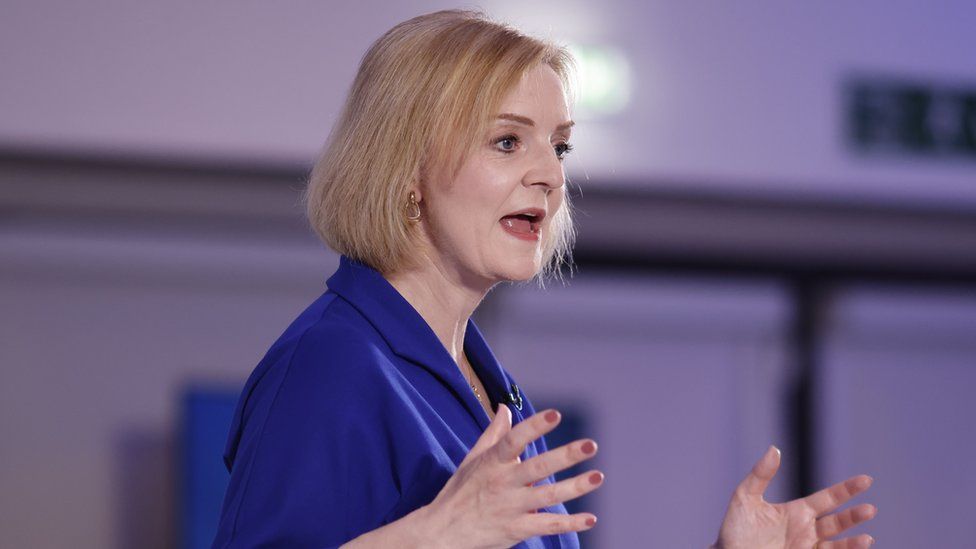ARTICLE AD BOX
By Iain Watson
Political correspondent, BBC News
 Image source, EPA
Image source, EPA
Liz Truss has ruled out further windfall taxes on energy companies
The cost-of-living crisis is likely to be high on the agenda at the final Conservative leadership hustings on Wednesday evening.
But as the pollsters' favourite to be crowned party leader and prime minister next week, Liz Truss is under particular pressure to spell out her plans in detail - especially after cancelling her interview with Nick Robinson scheduled for Tuesday night on BBC TV.
She has said she would "put money in people's pockets" by reversing the National Insurance rise and moving the cost of "green levies" from energy bills to general taxation, but she has been less specific about any additional help above and beyond what the government has already announced for the autumn.
The official line from her campaign is that she has ruled nothing out and will consider the options only if and when she gets to No 10.
But when her supporters have been approached to flesh out her thinking, they have not all been steering in the same direction.
One of her prominent backers said any extra help had to be well targeted and through the benefits system.
The current Chancellor, Nadhim Zahawi - a Liz Truss supporter - wants targeted help, too.
But his target is much bigger than just welfare recipients.
Range of options
He argued in the Daily Telegraph that extra support might have to extend to those earning £45,000 a year - well above the average income.
On the same day, one of my BBC colleagues said they had been steered towards a more universal offering.
But another colleague was told Team Truss would rule out any further direct support that goes to all households - such as the £400 energy bill rebate.
Subsequently, a member of her team re-emphasised that, in fact, that nothing had been ruled out after all.
Mr Zahawi has said that officials have been working on a range of options for the new prime minister to consider.
If Ms Truss's leadership rival, Rishi Sunak, were to win the contest, he has not yet said how much extra support with bills would be provided.
But we do know the mechanisms he would use, including more cash going directly to people who receive disability payments and to pensioners.
If the polling of Conservative members is broadly correct and Ms Truss does walk through the door of No 10 in a week's time, what options would she consider?
Blunt instrument
Her team may be sticking to the line that nothing has been ruled out, but in truth some things are highly unlikely.
She has already denounced the idea of further windfall taxes on energy companies as a "sticking plaster" solution that could discourage investment.
And she is not attracted to Labour's price cap freeze.
Image source, Reuters
Image caption,Rishi Sunak has not put a figure on how much extra support he would give
That said, Business Secretary Kwasi Kwarteng - tipped to be Ms Truss's chancellor if she wins - has met some energy companies that favour freezing prices now in return for a more modest decrease in bills later, when prices eventually fall.
The Centre for Social Justice - the think tank set up by the former Conservative leader Iain Duncan Smith, another Truss supporter - has advocated a substantial, temporary increase in universal credit which could help eight million households.
And Patrick Minford, the economics professor who has influenced Liz Truss's thinking on tax cuts, has said he too favours a "real-time" benefits uplift.
But that would not, of course, help those who are feeling the squeeze, but are not reliant on welfare - those identified by Nadhim Zahawi, for example.
So there is little doubt that among the options would be the sort of measures - such as council tax rebates - favoured by Mr Sunak when he was chancellor.
It is a bit of a blunt instrument, but by excluding those in the higher bands from any extra help, it could be claimed that it is targeted.
And the idea that VAT could be cut temporarily has been floated in some newspapers.
But there are downsides to that approach. While reducing prices would initially reduce inflation, the independent Institute for Fiscal Studies (IFS) has warned this is unlikely to last.
Inflation could go back up when VAT is increased again, while a short-term cut may also fuel optional spending, which in turn, could also push up inflation, the IFS cautions.
Anxious wait
At the final Conservative Party hustings on Wednesday evening, Ms Liz Truss is likely to be pressed to give more detail on her thinking.
She is likely to stick to the line that she wants to examine the "full facts" before taking final decisions,
And she will not presume to have won the contest at this stage.
But whether via a Budget or a "fiscal event", she will have to announce her cost-of-living measures before the Conservatives gather for their party conference season at the start of October.
So we may not have too long to wait until we know more - although for many struggling with their bills, it will be an anxious wait.
And the sense of uncertainty over what decisions she will take, if she wins power, seems to be shared by some of her own supporters.
As one Whitehall insider put it: "She will have options, but she just might decide they are all rubbish."

 2 years ago
27
2 years ago
27








 English (US) ·
English (US) ·